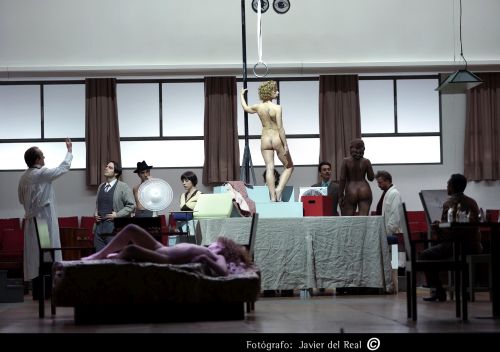 Spain Offenbach: Les Contes d’Hoffmann, Teatro Real Orchestra and Chorus, Sylvain Cambreling/Till Drömann (conductors), Teatro Real, Madrid, 12 & 18.6.2014 (JMI)
Spain Offenbach: Les Contes d’Hoffmann, Teatro Real Orchestra and Chorus, Sylvain Cambreling/Till Drömann (conductors), Teatro Real, Madrid, 12 & 18.6.2014 (JMI)

Casts:
Hoffmann: Eric Cutler/Jean-Noël Briend
Muse/Nicklausse: Anne Sofie von Otter/Hanna Esther Minutillo
Lindorf/Coppelius/Dr.Miracle/Dapertutto: Vito Priante
Olympia: Ana Durlovski
Antonia/Giulietta: Measha Brueggergosman
Antonia’s mother: Lani Poulson
Stella: Altea Garrido
Andres/Cochenille/Frantz/Pitichinaccio: Christopher Homberger
Spalanzani: Graham Valentine
Luther/Crespel: Jean-Philippe Lafont
Nathanaël: Gerardo López
Hermann: Tomeu Bibiloni
Schlemil: Isaac Galán
New production: Teatro Real in co-production with Opera Stuttgart
Direction: Christoph Marthaller
Sets and Costumes: Anna Viebrock
Lighting: Olaf Winter
In Christoph Marthaller’s productions, his deep thoughts always end up obscuring the plot of the opera. If somebody came to Teatro Real without knowing anything of Offenbach’s opera, not understanding French and without the translation screen, it would be impossible to figure out what’s going on. To begin with, the three acts, which are well distinguished in the opera, here share the same stage: a large room of Madrid’s Círculo de Bellas Artes, in what was supposed to be a tribute to Gérard Mortier, who frequented the club. The action appears to take place in the 1940s. Instead of Venice in Act 3, there are some pool tables that in the previous acts are replaced by female nude models posing for alleged painters. Apparently Antonia does not die since Act 2 ends with her just seated. Much has been said of modern directors attempting to bring opera to today’s public, but in this case it simply shows disdain for the audience. Mr. Marthaller’s stage direction generally works with the soloists and chorus, although there is an excess of movement on stage. In his interpretation, the alcoholic is not so much Hoffmann as Nicklausse.
The musical direction was in the hands of Sylvain Cambreling whose work has been disappointing to me on previous occasions, and this was no exception: bland and routine conducting. Mr. Marthaler and Mr. Cambreling are responsible for a most boring performance. They decided to add their own personal contribution to the act set in Venice, making it unnecessarily long and cutting off the famous septet. There were good performances from the orchestra and the choir. On 18 June, Till Drömann, assistant to Mr. Cambreling, was on the podium; I found more energy in his conducting but also an undesirable excess of volume.
The casting bore the imprint of Gérard Mortier, which is never a guarantee of quality but rather the opposite.
In the first cast, Hoffmann was sung by tenor Eric Cutler, whose performance I found unconvincing in vocal terms. His voice is good in the middle, but his high notes are always rather forced, and there is some monotony in his singing. In the second cast we had Jean-Noël Briend, whose presence in this theatre is not easy to understand. His voice is whitish with a not very consistent technique and is rather forced at the top. The risk of accident is quite high in the circumstances. And so it was: Act 3 was a permanent festival of broken sounds.
Mezzo soprano Anne Sofie von Otter in the part of Nicklausse was probably the best singer in the cast though her voice is now rather dry and her volume leaves something to be desired. Hanna Esther Minutillo sang the part in the second cast. If Ms. von Otter’s voice is small, Ms. Minutillo’s is not any bigger, while her singing falls below her colleague’s.
Vito Priante played the four Devils (Lindorf, Coppelius, Dr. Miracle and Dapertutto). He was good on stage, but his voice is not well suited to the characters: his baritone is rather light, far from the bass-baritone needed here.
Ana Durlovski was an excellent Olympia, somewhat lifeless as a stage character but irreproachable as singer. She has the needed vocal agility and is easy at the top, which is essential to succeed as Olympia.
Measha Brueggergosman was Antonia and Giulietta. She is suited to Giulietta but Antonia is not for her: the top notes were a torment.
In the supporting cast, Graham Valentine as Spalanzani offered one of the ugliest voices I’ve ever heard in a theater. Jean-Philippe Lafont (Luther and Crespel) once again showed that his voice is ruined. Christoph Homberger played the four cameos (Andrès, Cochenille, Frantz and Pitichinaccio) without much relief. Lani Poulson was correct as Antonia’s Mother. I should end by saying that Mr. Marthaller’s final gesture was to cast as Stella an actress who recites a poem by Fernando Pessoa for two long minutes.
José Mª Irurzun